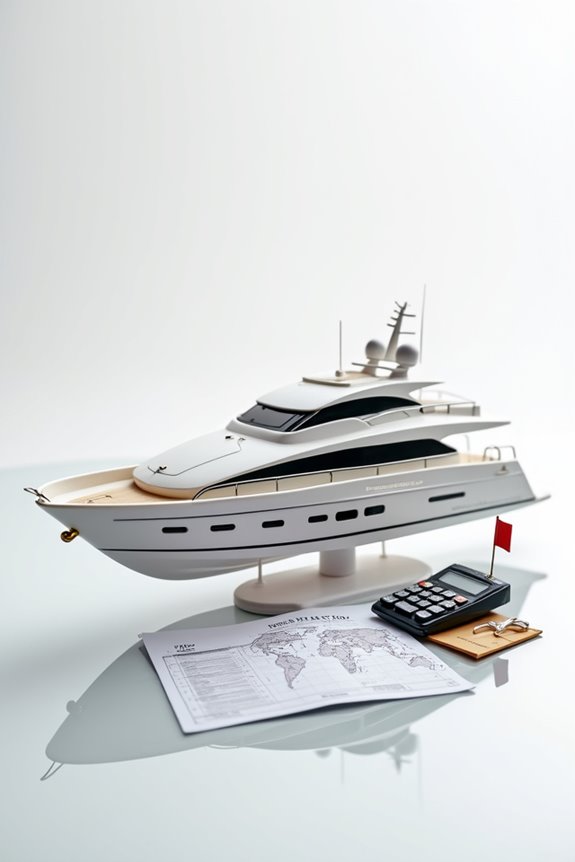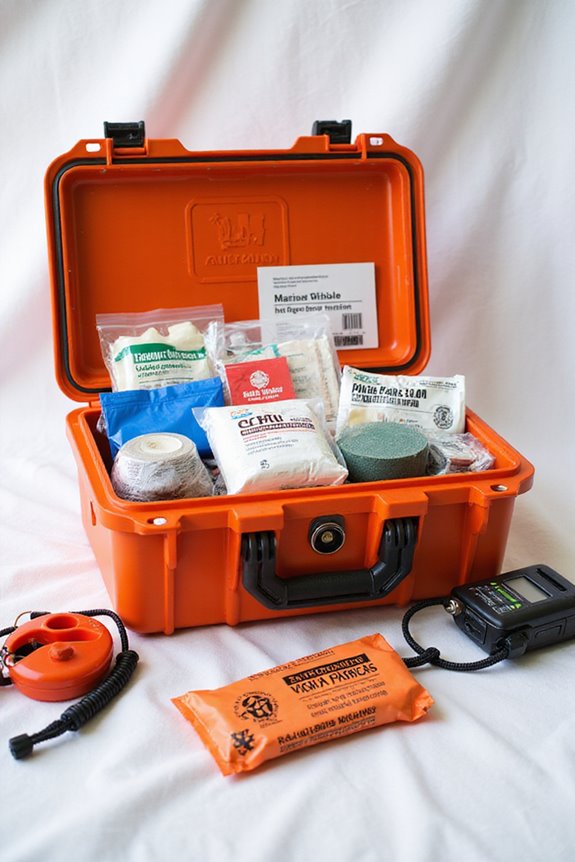Steering yacht taxes and import duties can feel like steering through choppy seas, right? Different countries charge wildly varying tariffs—like China’s hefty 54% versus the UK’s chill 10%—and VAT rates jump around too. Plus, buying or transferring yachts in international waters can save you some tax headaches, thanks to UNCLOS rules. Customs paperwork and temporary admittance rules add another layer to the voyage. Stick with us—we’ll help you chart a smoother course through these financial waters.
Key Takeaways
- Yacht import duties vary widely by country, ranging from 10% in the UK to up to 54% in China.
- Transactions conducted in international waters can avoid immediate taxes and simplify ownership transfers under UNCLOS rules.
- VAT rates on yachts differ globally, from 0% in the Caribbean to up to 22% in Europe, influenced by charter duration and location.
- Proper customs documentation and compliance with temporary admission rules are essential for avoiding penalties during yacht import and inspections.
- Understanding regional tax environments, including low-tax jurisdictions, helps minimize overall yacht taxation and import duty costs.
Import Duty Rates and Exemptions for Yachts
Ever wondered why yacht prices can skyrocket just by changing their docking spot? It all comes down to import duty and those sneaky tariff exemptions. Different regions slap on varying import duties—China can charge up to 54%, while the UK sticks to a modest 10%. So, where you dock your yacht really matters. Some countries, blessed by free trade agreements, offer tariff exemptions that can save us a pretty penny. Got your heart set on a yacht from Turkey? Good news—they’re gaining popularity thanks to lower 10% tariffs. But watch out—places like Malaysia hit you with up to 46%. Understanding these rates helps us navigate the yacht-buying maze without drowning in extra fees. Looks like knowing the rules can save us both cash and headaches!
Tax Efficiency of Yacht Transactions in International Waters
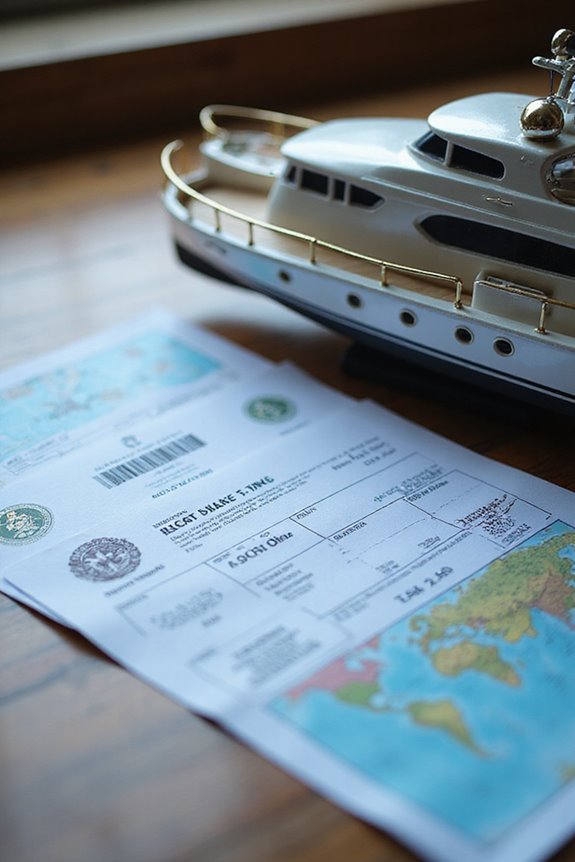
While you might think buying or selling a yacht is straightforward, doing it in international waters can actually save us a bundle in taxes and fees. The key? Tax benefits tied to ownership transfer outside any single country’s jurisdiction. Because international waters are governed by UNCLOS, transactions here dodge immediate tax hits and import duties that usually come with shore-based deals. Plus, we get streamlined ownership transfers thanks to the legal neutrality of these waters—no messy local red tape holding us back. Of course, proof like GPS logs helps back up the yacht’s location during the swap, keeping things legit and smooth. So, sailing into international waters isn’t just about the view—it’s a smart move for anyone who loves a good deal with a side of legal simplicity.
Value Added Tax (VAT) Considerations for Yacht Purchases

Steering yacht taxes is one thing, but when it comes to Value Added Tax—or VAT—it’s a whole different ball game that can really affect the final cost of a purchase. We all want to enjoy smooth sailing, right? Well, VAT implications can vary wildly depending on where you’re buying and chartering. For instance, in Europe, rates can hit up to 22%, while some Caribbean spots offer a sweet 0%. Ever heard of charter duration? Longer charters might earn you reduced VAT rates, so planning your trip length could save a pretty penny. Also, watch out for how VAT applies during your time spent in different territorial waters—some places charge VAT only on days you’re actually chartering there. Getting familiar with these details helps us navigate costs smarter, avoiding surprises on the horizon.
Navigating Customs and Regulatory Requirements
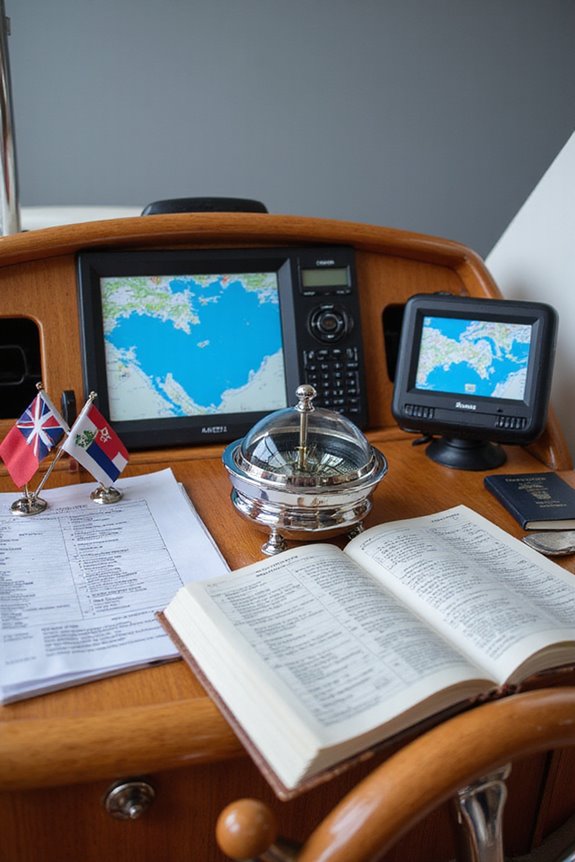
Because yacht adventures often cross borders, we’ve got to get cozy with customs and regulatory requirements before hitting the water. Managing customs documentation is essential; you’ll need registration papers, proof of insurance, and sometimes a Bill of Lading if shipping internationally. Ever heard of temporary admission? It lets non-EU flagged yachts enjoy up to 18 months in EU waters without VAT on the hull—pretty sweet for private pleasure cruising. Just remember, temporary admission demands that your yacht isn’t used commercially or sold within the EU during that time. Customs inspections check your paperwork and yacht condition on arrival, so staying organized is key. We recommend working closely with customs and perhaps a marine surveyor to sail smoothly through these formalities. After all, no one wants their voyage delayed by missing documents, right?
Comparative Yacht Tax Rates Across Different Regions
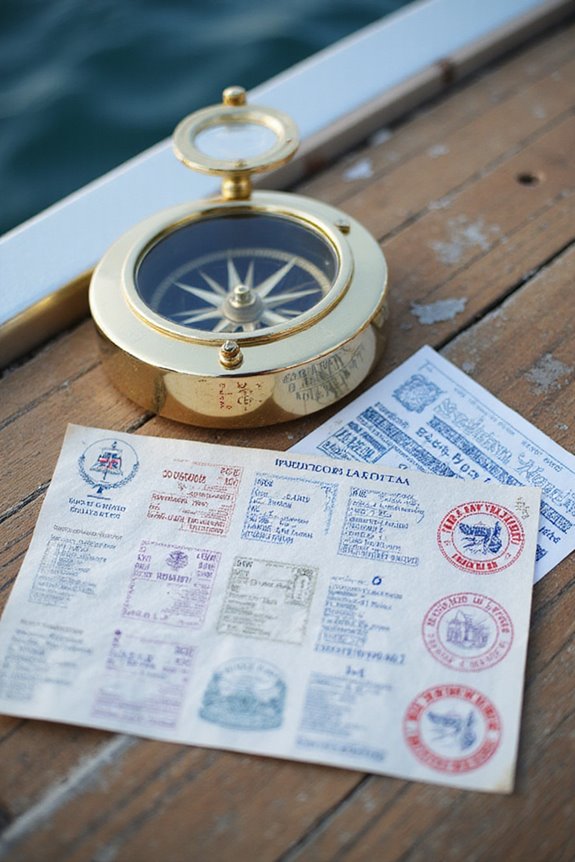
When it comes to yacht taxes, not all regions play by the same rules, and that can really impact how much you end up paying. For instance, in the U.S., yacht tax comparisons reveal tariffs vary widely—EU yachts often face steeper import duties than those from places like Australia or the UAE. Meanwhile, across the EU, VAT rates fluctuate from 17% to 27%, with Malta standing out by offering lower effective VAT through a clever leasing scheme. Then there are low-tax spots like the Bahamas and the Maldives, where VAT and other taxes sway the final cost even further. Understanding these regional tax implications helps us make smarter decisions—because paying less tax isn’t just luck, it’s about knowing where the waters are friendlier. Who knew tax could be this nautical?
Legal and Compliance Issues in International Yacht Operations
Although owning a yacht sounds like smooth sailing, traversing the legal and compliance waters of international operations can be a bit more choppy than you’d expect. We have to stay sharp on flag state compliance since the yacht registration you choose sets the rules for crew qualifications, safety, and environmental standards. Picking a reputable flag—ideally one from the Paris White List—makes your life easier, avoiding extra inspections and delays in foreign ports. Plus, for larger yachts, compliance isn’t just paperwork; it’s about meeting standards like the Maritime Labour Convention and keeping safety certifications current. It’s a bit like following a maritime rulebook that keeps your yacht legal and your adventures worry-free. After all, who wants to be stuck at port because of a missed form?
Strategies for Effective Yacht Tax Planning and Management
Steering through legal rules is just one part of managing a yacht—you’ve also got to keep an eye on the tax side of things, which can be just as tricky but far less exciting than a day on deck. For effective yacht tax planning, we recommend setting your yacht’s tax residency wisely, often aligning it with jurisdictions that offer real benefits, like Malta or the Cayman Islands. Registering through offshore entities can shield us from hefty taxes and even offer perks like depreciation and reduced VAT via leasing structures. Ever thought about using corporate models, such as LLCs? They’re great for limiting liability and optimizing financing deductions. Planning yacht sales or ownership transfers in international waters? That’s a savvy move to defer taxes and avoid certain import duties. Keen to sail through taxes smoothly? Let’s chart that course together.
Frequently Asked Questions
How Does Yacht Flag Registration Affect Tax Liabilities?
You might think flag state fees just add up—but we understand flag state choice impacts tax compliance and liabilities deeply. Together, we optimize registration to reduce taxes, ensuring we sail stress-free with our yacht’s financial health intact.
Can Yacht Chartering Impact Import Duty Exemptions?
It is understood that charter regulations affect duty exemptions directly. When we charter yachts, adhering to rules can help us qualify for exemptions, especially with YET certificates, ensuring we stay compliant while maximizing tax benefits within our boating community.
What Insurance Is Required When Importing Yachts Internationally?
When steering through international yacht imports, we usually embrace marine insurance to softly shield against voyage uncertainties. Together, we guarantee compliance with customs regulations, fostering security and belonging within our community of responsible yacht importers.
How Are Yacht Taxes Enforced During Offshore Refits?
When maneuvering refit regulations together, we guarantee tax compliance by maintaining strict documentation and adhering to authority control during offshore refits. This way, we protect our shared investment and foster a smooth, community-driven process.
Are There Tax Benefits for Eco-Friendly Yacht Designs?
We believe eco incentives make sustainable materials in yacht designs worth embracing. Together, we can enjoy tax benefits that reward our commitment to greener boating, fostering a shared passion for protecting our oceans and embracing innovation.

